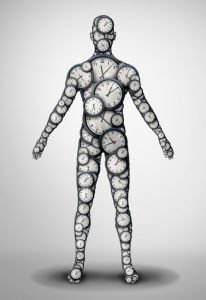Pollution is all around us, in our water, soil and even the air we breathe. This can affect our health in a variety of ways, exacerbating illnesses such as asthma and even leading to cancer. According to new research, pollution from simple and common chemicals such as road salt can have serious effects on our internal clocks. In fact, some of the links between pollution and common cancers may be due to the unique way that pollution disrupts the circadian rhythm.
Road Salt: A Dangerous Carcinogen?

This can have disastrous effects for the plants and animals that rely on freshwater in their ecosystem, particularly aquatic life. It also can have serious effects on the circadian rhythm.
According to a recent study, a type of plankton common in freshwater reacts to changes in water salinity by changing its circadian rhythm. The plankton species Daphnia is an important part of freshwater ecosystems, purifying water and serving as a food source for many animals in the water where it lives. Daphnia, like all organisms, has internal clocks that follow a 24-hour cycle, or a circadian rhythm. It lives mostly in deep water but comes up to shallow water at specific times of the day according to the temperature of the water and other timing cues.
When Daphnia is exposed to pollutants such as road salt, its circadian rhythm changes. The daily cycles of this micro-organism become less responsive to water temperature and increasingly dysregulated. Without the ability to respond to external cues such as temperature, these tiny plankton begin to rise to the surface at random times of the day. During these times, the animals that feed on Daphnia are less likely to be at the surface. Because Daphnia are the foundation of many ecosystems, this can destabilize the entire food chain.
Although this study has frightening implications for ecosystems that depend on Daphnia, it is also bad news for human health. New research suggests that humans may have a similar reaction to common environmental pollutants.
How Pollution Disrupts the Circadian Rhythm of Humans
Although humans are not as dependent on the salinity of our environment to maintain our circadian rhythm, research shows that we still exhibit changes in internal clocks when exposed to pollution. Pollution in the air can affect light levels, which are one of the most important cues for our circadian clocks. Light pollution can also affect the way our brains perceive the time of day, keeping us from getting the deep sleep that we need for good health.
Interestingly, polluted air appears to have similar effects on humans as polluted waters have on Daphnia plankton. Our respiratory and cardiovascular function follows a distinct circadian rhythm, with essential functions such as oxygenation, blood pressure and heart rate varying predictably according to the time of day. However, exposure to air pollution can make a meaningful difference — both in our circadian rhythm and our overall health.
Several studies have found that our respiratory function, blood pressure and pulse stop following their distinctive circadian rhythm when we are exposed to high levels of air pollution. This appears to be due to the effect of pollution on inflammatory markers and the genes that produce them.
When our bodies produce inflammatory biochemicals, they also produce antioxidants and other biochemicals that help to mitigate the effects of inflammation. When we are exposed to air pollution, these inflammatory molecules begin to be produced without the antioxidants that reduce their impact on our cellular health. The results can be disastrous, leading to damage to our lungs and heart as well as the blood vessels that supply them.
Circadian Rhythm: Why Timing is Everything

This is concerning in a time when our circadian rhythms are at high risk. Not only do we have schedules that keep us from sleeping at night and waking at a natural time, but we also are exposed to pollutants that appear to affect our internal clocks. Although we may not be able to undo the effects of our environment completely, it is more important than ever to keep our circadian rhythms on track.
Are your sleep-wake cycles on a steady rhythm? If not, you may need to make some changes. A well-regulated circadian rhythm is the first step to a healthy and happy life.







